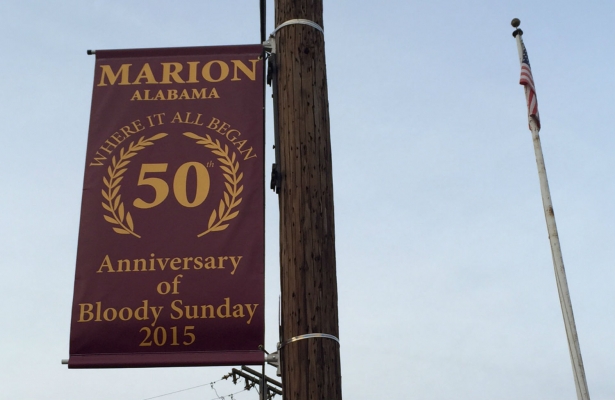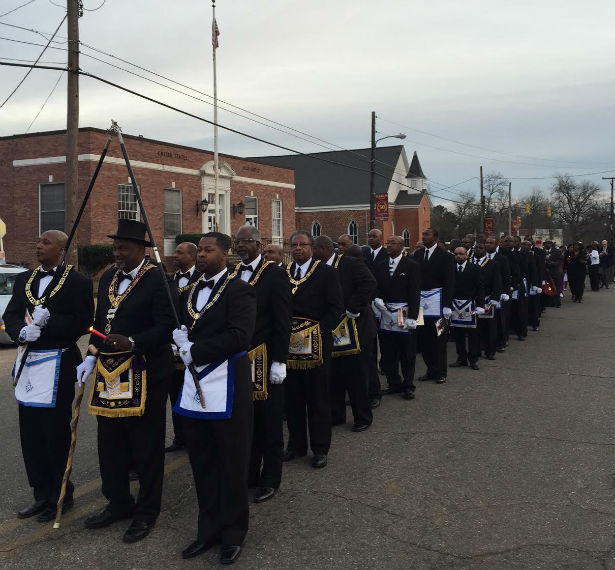This post first appeared at The Nation.

A sign in Marion, Alabama, commemorates the fiftieth anniversary of “Bloody Sunday.” (Photo: Ari Berman)
On February 18, 1965, James Orange, an organizer with Martin Luther King’s Southern Christian Leadership Conference, was arrested in Marion, Alabama, 30 miles from Selma, after leading young people in a voter registration drive. Word spread through the black community that Orange would be lynched that night in the county jail off the town’s main square.
Two hundred civil rights activists gathered at Zion United Methodist Church to hold a rare night march to the jail, where they would sing freedom songs outside. The congregation included 26-year-old Jimmie Lee Jackson, a deacon and woodcutter who had tried to register to vote five times in Perry County, where only 265 of 5,202 eligible black voters were on the voting rolls.
When the marchers stepped outside, hundreds of policemen and state troopers in riot gear surrounded the church. They brutally beat the civil-rights activists and attacked the reporters who were covering the demonstration. As a result, there is no photographic or video record of the tragic events that night.
Jackson, his mother Viola, and his 82-year-old grandfather, Cager Lee, fled for safety at nearby Mack’s Café. State troopers stormed in and began beating Jackson’s grandfather and mother. When Jackson lunged to protect his mother, an Alabama state trooper shot him point-blank in the stomach. He was sent to Selma’s segregated Good Samaritan Hospital, where Col. Al Lingo of the Alabama Department of Public Safety served him with a warrant for assault and battery with the intent to murder an Alabama state trooper, even though the police had been the clear aggressors. Jackson died eight days later. Historian Taylor Branch called him “the first martyr” of the Selma voting rights struggle.

Hugh Stewart, a veteran of “Bloody Sunday,” remembers Jimmie Lee Jackson in Marion, Alabama. (Photo: Ari Berman)
At a mass meeting at Selma’s Brown Chapel, King aide James Bevel introduced the idea of marching from Selma to Montgomery to protest Jackson’s death. That march became “Bloody Sunday,” which led to the Voting Rights Act (VRA) eight months later. Jackson’s grandfather Cager Lee, the son of a slave, marched next to John Lewis from Selma to Montgomery, and registered and voted for the first time after the passage of the VRA.
It took far longer for justice to be served to Jackson’s killer, as the New York Daily News reported:
The state police corporal who shot him, James Bonard Fowler, escaped indictment by an all-white Perry County grand jury in the fall of 1965. In 1966, he shot and killed another black man during a scuffle in a local jail near Birmingham, and two years later he was fired from the patrol after severely beating a fellow officer.
The case was reopened when John Fleming of The Anniston Star found Fowler living on a farm in southern Alabama in 2005 and he confessed to the crime. He pled guilty to manslaughter, but received only six months in prison. He was released in 2011.
On February 15, 2015, civil-rights activists gathered at Zion United Methodist Church in Marion to honor Jackson on the 50th anniversary of his death. King aide C.T. Vivian, who spoke in Marion on the night of February 18, 1965, attended the ceremony, as did Congresswoman Terri Sewell, Alabama’s first black congresswoman.
Sewell presented Jackson’s sister and niece with a framed copy of remarks she made on the House floor honoring him. “No floor speech, no medal, can bring back Jimmie Lee Jackson,” Sewell told his family. “But please know he didn’t die in vain. I walk the halls of Congress because of his death.”
After the ceremony, hundreds recreated the short march from the church to the boarded-up county jail. Today, there are black officeholders across Perry County and black policemen were on hand to supervise the commemoration march.
More than 20 veterans of Bloody Sunday came from across the country to honor Jackson. Hugh Stewart, who was a 17-year-old high school senior in Marion in 1965, wore blue denim overalls over his suit as a dedication. He marched in Marion 50 years ago and again on Bloody Sunday. By the time he made it from Selma to Montgomery, there was no bottom on his shoes.
Signs in Perry County commemorating the 50th anniversary of Bloody Sunday describe Marion as the place “where it all began.”



